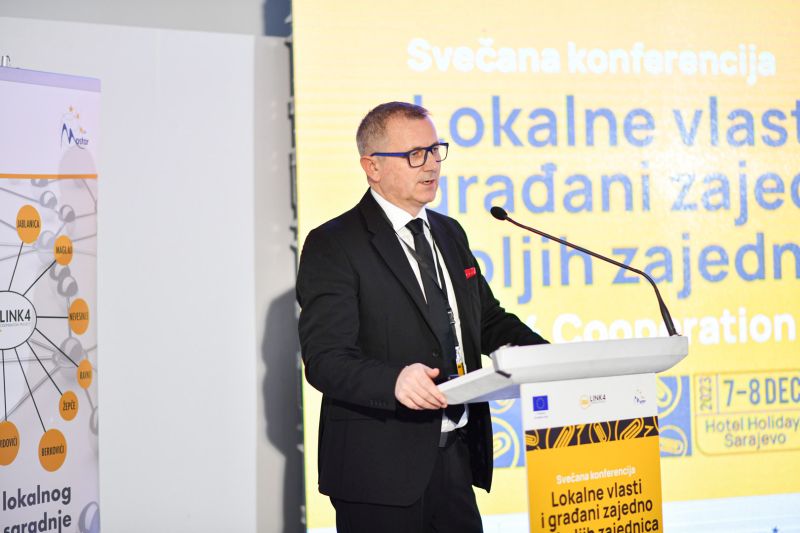
Deputy State Coordinator for Public Administration Reform Darko Kasap participated in the conference entitled “Local authorities and citizens together for better communities”, held today in Sarajevo, and on that occasion he said that “Public administration reform is one of the prerequisites for the successful integration of Bosnia and Herzegovina into the European Union, which implies that the country must have an administration capable of taking over and implementing the law, principles and good practices of the European Union”.
The conference was organized within the framework of the three-year project “Strengthening local participation and cooperation through the partnership of public authorities and civil society organizations in Bosnia and Herzegovina – LINK for cooperation”, which is financed by the European Union, supporting the realization of 22 projects of civil society organizations with grants.
Through project activities, the capacities of a total of 12 local self-governments and 40 civil society organizations from the territory of BiH were strengthened, and the citizens of 12 local communities were given the opportunity to express their opinions more quickly and easily and co-create decisions in cooperation with the authorities.
In his opening address, Darko Kasap mentioned that the PARCO implements the reform based on the SIGMA principles of good administration, which represent comprehensive standards based on Union law, based on OECD recommendations, international standards and good practices.
“Such principles and practices reflect the values and behaviors that our citizens can and should expect from the public administration of our country. Although it is extremely important for our entry into the Union that, above all, at the state and entity level, we build an administration that will respect these standards. We at the PARCO are aware that the most important thing for many citizens is what happens in their local communities, that it is precisely in local communities that citizens encounter the most everyday problems. That is why we strongly support this project and efforts to ensure good governance, through responsible management of public affairs and management of public resources, in local self-government units as well,” Kasap explained.

He assessed that it is the duty of local communities to do everything in order to reach the standards contained in the 12 principles of the Council of Europe, because the state administration is also trying to adapt to the SIGMA principles of good governance.
“By accepting and applying these principles, local governments will confirm their determination to work in the best interest of citizens, that they really want to improve and facilitate life in local communities and provide quality, fast and affordable services. The principles of the Council of Europe do not differ too much from the standards we introduce in public administration at other levels. “Ethical behavior of officials, the rule of law, efficiency and effectiveness, transparency, good financial management and responsibility for decisions made by the administration, as well as meritoriousness and the absence of political interference are required of us,” Kasap said.
He stated that the state administration and local self-government are also required to put the interests of the citizens in the first place against the interests of narrow privileged groups, to ensure a high level of respect for human rights and social cohesion, to have an administration that thinks about long-term development and in an inclusive manner, listening to the needs of citizens and consulting civil society organizations, and also the willingness to accept innovations and changes and to do it all in a responsible and transparent manner is required.
“The Public Administration Reform Coordinator’s Office strongly supports the reform of local levels of government in BiH, and the efforts of the European Union, civil society organizations, citizens and local levels to build a more modern and transparent local self-government that meets Union standards through this project. A more democratic and inclusive local self-government can help promote stronger engagement of citizens, can stimulate socio-economic development and improve public services, and thus stop, especially in less developed areas, the departure of young people from local communities to cities,” said Kasap.
He concluded that everyone expects and hopes that many of our municipalities will very soon earn the Council of Europe’s mark of excellence and thus increase citizens’ trust in local government and governance in the country in general, but also promote themselves as communities worth living in and worth investing in.
The central event of the conference was the awarding of the European Label of Excellence in Governance (ELoGE) of the Council of Europe to local self-government units, which successfully completed the ELoGE program, based on the self-assessment of local governments in relation to the 12 principles of good democratic governance.
Out of a total of 12 local governments that participated in the ELoGE process, the Municipality of Jablanica, the City of Prijedor and the Municipality of Žepče received this prestigious designation.
The awards were presented to the local governments by the deputy head of the Council of Europe’s Center of Expertise for Good Governance, Niall Sheerin, who emphasized on this occasion: “By undertaking the application of the ELoGE Standard, local governments in Bosnia and Herzegovina agree to measure their performance against each of the 12 of the principles of good governance, thereby raising awareness and thinking about one’s own practice of democratic governance.”
“ELoGE is a confirmation that we are on the right track to achieve a high level of good governance. The application of good management practices can help the municipality of Žepče to achieve greater efficiency, transparency and accountability, and to better respond to the needs of its citizens. This will result in a stronger local community and a better quality of life for all citizens,” said the mayor of the Municipality of Žepče, Mato Zovko.
The project coordinator, director of the Mostar Local Democracy Agency, Dženana Dedić, emphasized on this occasion the importance of good governance and effective civic participation at the local level as pillars of democracy that encourage innovative solutions and trust in local governance, which leads to the creation of resilient, inclusive and sustainable communities.
The e-participation tool for citizens was also presented at the conference, which is implemented through 12 smart benches purchased and installed from the project budget. Thus, for the first time in BiH, smart benches will serve as a means of communication between citizens and local authorities. With the help of innovative technology integrated into the benches, citizens of Berković, Jablanica, Kostajnica, Maglaj, Mostar, Nevesinje, Novi Grad, Prijedor, Ravno, Trebinje, ZavidovićI and Žepče will now have the opportunity to participate in the creation of decisions related to their local communities through new technologies.
